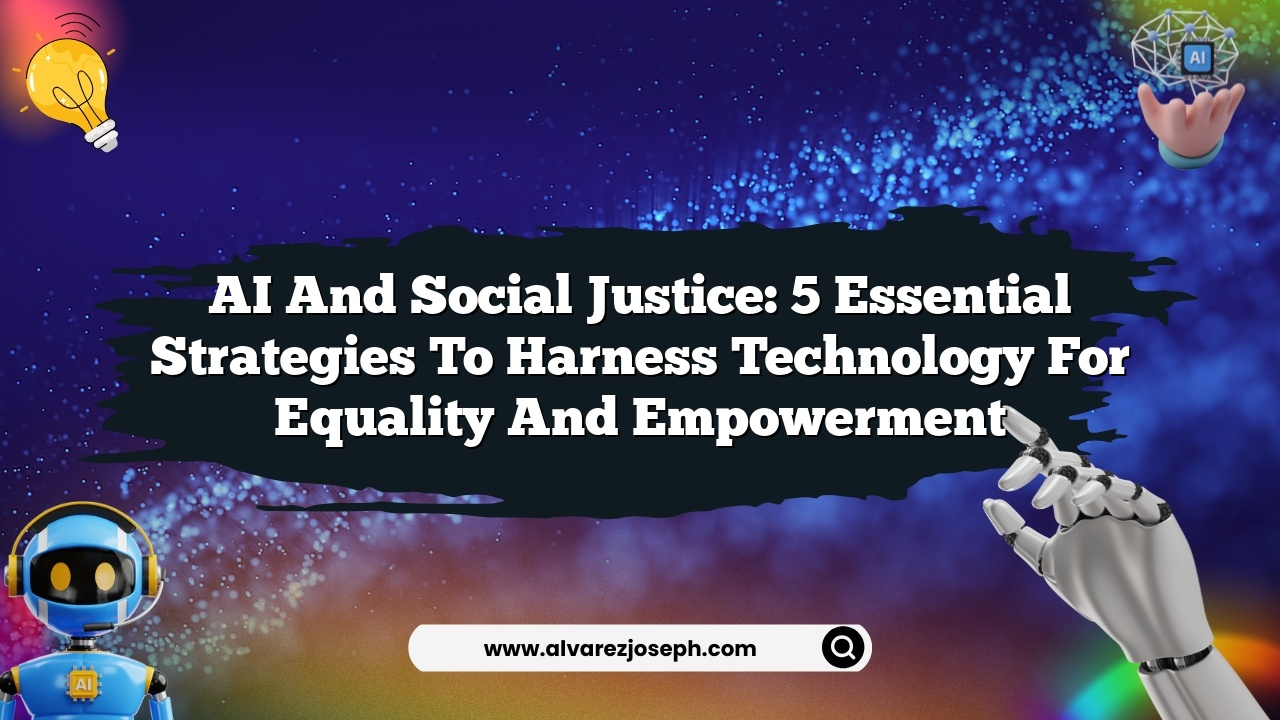The future of AI and social justice is a pivotal conversation that resonates deeply across various sectors of society. As the technological landscape evolves, the intersection of AI ethics and social justice in technology becomes increasingly relevant, with thinkers like Ruha Benjamin leading the charge. By challenging the narratives imposed by tech elites, who often prioritize profit over humanity, we begin to uncover the hidden implications of AI systems on marginalized communities. Benjamin emphasizes the necessity of integrating human values into AI development, urging a collective shift towards creative inquiry in education that enables a more equitable future. By fostering open dialogue and critical thinking, we can aspire to a world where technology serves as a vehicle for social equity rather than oppression.
Exploring the prospects of artificial intelligence in relation to equity and societal fairness opens up essential discussions around emerging technologies. This dialogue emphasizes the importance of ethical considerations within technological development and implementation, as represented by thought leaders like Ruha Benjamin. The narrative often revolves around the responsibilities that come with these innovations, urging society to rethink our dependence on algorithmic solutions while recognizing their potential biases. The call for an educational framework that highlights creativity and critical inquiry in the arts and humanities is crucial for developing a future where technology enhances human dignity and justice rather than exacerbating existing inequalities. As we imagine what tomorrow could look like, it is vital to consider how advancements in AI can align with our aspirations for a just society.
The Role of AI Ethics in Shaping Future Technologies
AI ethics plays a crucial role in the future of technology as it addresses the moral implications and societal impacts of artificial intelligence. Researchers and developers are increasingly called to establish ethical guidelines to ensure that AI systems promote fairness, accountability, and transparency. The integration of ethical values into AI development can significantly reduce the risks associated with biased algorithms and discriminatory practices. As highlighted by Ruha Benjamin, it is essential to question the motivations behind AI technologies that are marketed as solutions to societal problems, as they may unintentionally perpetuate existing inequalities.
Incorporating human values into AI design is not only about preventing harm but also about fostering a technology that uplifts and empowers marginalized communities. This ethical approach requires a collaborative effort among technical experts, social scientists, and community voices to ensure that AI systems are developed with an inclusive mindset. By prioritizing ethical considerations in AI, we can help craft a future where technology serves as a tool for social justice rather than oppression.
Frequently Asked Questions
How does Ruha Benjamin view the future of AI and social justice?
Ruha Benjamin argues that the future of AI does not have to be dystopian and emphasizes the importance of integrating social justice into technology. She critiques the motivations of tech elites and calls for a holistic approach that includes human values and collective good, rather than relying solely on algorithms. Benjamin advocates for creativity and imagination in envisioning a world that prioritizes justice and equity.
What role does AI ethics play in social justice according to Ruha Benjamin?
AI ethics is crucial in the discourse surrounding social justice, as highlighted by Ruha Benjamin. She contends that AI technologies often perpetuate oppression rather than alleviate it, particularly for marginalized communities. Ethical considerations in AI deployment must address historical injustices and ensure that new technologies do not replicate past harms, emphasizing the intersection of technology and human values.
What dangers does Ruha Benjamin associate with AI technologies marketed as progressive?
Benjamin points out that AI technologies marketed as “efficient” can lead to serious social consequences, such as increased oppression for marginalized groups. Technologies like facial recognition and automated systems can perpetuate injustices similar to those seen in historical eugenics movements, emphasizing the need for critical evaluation of these tools in the context of social justice.
How can creative inquiry in education influence the future of AI and social justice?
Creative inquiry in education can profoundly shape the future of AI and social justice by encouraging critical thinking and imaginative solutions. Ruha Benjamin calls for universities to integrate arts and humanities, allowing students to reimagine technology in a way that challenges the status quo and promotes a just society. This approach cultivates new perspectives on how AI can serve humanity positively.
Why does Ruha Benjamin critique the trust placed in tech elites regarding AI and social innovation?
Ruha Benjamin critiques the trust placed in tech elites as unwarranted, arguing that many of their visions for AI lack consideration for social implications and collective good. She emphasizes that tech billionaires claiming to solve human suffering often prioritize self-interest, and thus, we should not rely solely on their perspectives when exploring technological innovations aimed at social justice.
| Key Points |
|---|
| Ruha Benjamin argues for a radically different future for humanity without fear from technological dystopias. |
| AI technologies often perpetuate oppression and can harm marginalized groups. |
| There is skepticism about trusting tech elites to improve human welfare. |
| A call to prioritize arts and humanities to foster critical and creative thinking. |
| Encouragement to envision a more equitable future beyond traditional systems like policing and surveillance. |
Summary
The future of AI and social justice calls for a critical reevaluation of how artificial intelligence systems are developed and utilized in society. Ruha Benjamin emphasizes the need to reimagine AI in a way that prioritizes the voices and experiences of marginalized communities. Rather than allowing billionaires or tech elites to dictate the terms of our future, we should foster discussions that include diverse perspectives, particularly from the arts and humanities. Ultimately, creating a just society rests on our ability to dream boldly and envision systems that are equitable and free from oppression. As we move forward, it’s crucial to dismantle the entrenched structures that reinforce inequality and imagine new possibilities for a more humane future.
